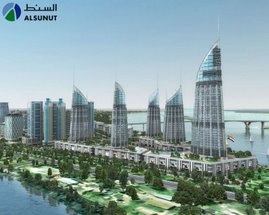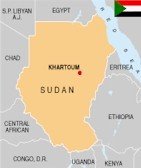

Despite new economic policies and infrastructure investments, Sudan still faces formidable economic problems as it must rise from a very low level of per capita output. Since 1997 Sudan has been implementing the macroeconomic reforms recommended by the IMF. In 1999, Sudan began exporting crude oil and in the last quarter of 1999 recorded its first trade surplus. Increased oil production (the current production is about 520,000 barrels per day) revived light industry, and expanded export processing zones helped sustain GDP growth at 6.1% in 2003. These gains, along with improvements to monetary policy, have stabilized the exchange rate. Currently oil is Sudan's main export (363,000 barrels per day), and the production is increasing dramatically. With rising oil revenues the Sudanese economy is booming at a growth rate of nearly 7% in 2005.
Agriculture production remains Sudan's most important sector, employing 80% of the work force and contributing 39% of GDP, but most farms remain rain-fed and susceptible to drought। Chronic instability — including the long-standing civil war between the Muslim north and the Christian/animist south, adverse weather, and weak world agricultural prices — ensure that much of the population will remain at or below the poverty line for years.
ताकें फ्रॉम http://en.wikipedia.org/wiki/Sudan
Agriculture production remains Sudan's most important sector, employing 80% of the work force and contributing 39% of GDP, but most farms remain rain-fed and susceptible to drought। Chronic instability — including the long-standing civil war between the Muslim north and the Christian/animist south, adverse weather, and weak world agricultural prices — ensure that much of the population will remain at or below the poverty line for years.
ताकें फ्रॉम http://en.wikipedia.org/wiki/Sudan










2 comments:
Hi Max,
Great work!
You impressed on me every day , Go on your work , you'll have a bright future
Congratulations on your first blog!
Post a Comment